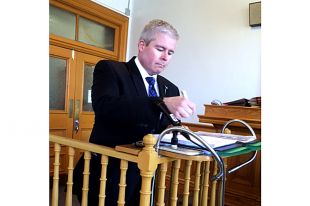Archdiocese Had No Official Role at Mount Cashel: Witness
By Barb Sweet
The Archdiocese of St. John’s had no control over the vetting of Christian Brothers assigned to Mount Cashel, nor do historical documents show a role in operating or financing the facility or being wardens of the boys at the orphanage, the Mount Cashel civil trial at Newfoundland Supreme Court in St. John’s was told Thursday. Historian John FitzGerald, expert witness for the RC church, is seen prior to testifying Thursday at the Mount Cashel civil trial. — Photo by Barb Sweet/The Telegram Historian John FitzGerald is testifying as an expert witness for the church, and questioning of him by the church’s lawyer Mark Frederick finished Thursday morning. “The documents when read indicated to me that the archdiocese was operationally unconnected with the running and management and control, etcetera, of Mount Cashel orphanage and that was the work of the Christian Brothers,” FitzGerald told the court. The lawsuit against the Roman Catholic Episcopal Corp. of St. John’s seeks compensation and involves four test cases that claim the church should be held liable for the physical and sexual abuse of boys at the orphanage by certain Christian Brothers during the period late 1940s to early 1960s. The test cases represent about 60 claimants in the case being pursued by Budden and Associates. The church contends it did not run the orphanage, therefore is not responsible for actions there of the lay order Irish Christian Brothers. FitzGerald, who reviewed historical documents and wrote a report on the relationship between the archdiocese and the Christian Brothers, said the Brothers were a separate incorporated entity. But claimants’ lawyer Geoff Budden, in cross-examination, asked Fitzgerald to read out June 1953 correspondence between the orphanage Brother superior and the archbishop. Fitzgerald has stated it was common for the Brothers, congregations of nuns or other religious orders to check with the archdiocese out of courtesy when scheduling events to make sure various fundraising efforts weren’t putting a burden on parishioners at the same time. The letter from the Brother superior sought to hold a week-long fair on the Mount Cashel grounds in July 1953. The Brother superior noted the orphanage was in a monthly deficit position, and among other things, needed to add fire escapes, as the boys’ dwelling was a “real fire trap.” The Brothers needed funds to pull the orphanage through until the annual Christmas Raffle. But the archbishop noted, in part, the Brother superior’s financial statement seemed more a outline than a comprehensive report and denied the request and advised prudence. “Permission denied?” asked Budden. “In this instance, who was it that was controlling the use of the Mount Cashel grounds?” “I believe the archbishop was seeking to manage the calling upon of resources of the diocese and more particularly calling upon the parishioners of the diocese who would be asked to not only support a week’s fair but ... garden party, annual collections and a number of other attempts to go,” FitzGerald replied. “But it could be read he was attempting to limit the holding of the fair at Mount Cashel.” Budden got him to concede there is no evidence in the documentation he reviewed that there was pushback from the Brothers to the archdiocese for denying the request. Thursday morning, FitzGerald told church lawyer Mark Frederick the design of the orphanage was supervised by the Christian Brothers and modelled on the lay order’s much larger industrial school in Arcane, Dublin, Ireland. The Brothers, he said, were up on the scaffolds and oversaw the construction. The facility opened in 1898. He said priests were not the ones who admitted any boys to the orphanage, but noted in the earlier part of the 20th century, priests were often the only people in their communities with cars, and so were called upon for transportation, such as if someone needed to go to the hospital. Fitzgerald said the Christian Brothers’ reputation, particularly in education, was sterling up until the sexual abuse scandal broke in the 1980s. He said that in the 1940s and ’50s, the Brothers were so well thought of in Newfoundland that families and people in the community would not challenge the Brothers if any allegations came forward. One report from the era brought up at the trial suggests there was a dialogue between the archdiocese and Brothers about allegations concerning the actions of an orphanage worker, and the documentation shows that the Brothers indicated the matter would be referred to the RCMP — which then had jurisdiction for the area in which Mount Cashel was located. Fitzgerald said that indicates the Brothers handled the matter, not the archdiocese. As for the parish that was on site, FitzGerald said it was small and would not have had the money for separate quarters, so by the grace of the Brothers, there was an apartment connected to the orphanage for the parish priest. He said priests assigned there were usually elderly or of ill health, as it was seen as a lightduty parish. The Mount Cashel civil trial continues Friday and into next week, but will break after Wednesday until early June.
|
.
Any original material on these pages is copyright © BishopAccountability.org 2004. Reproduce freely with attribution.
